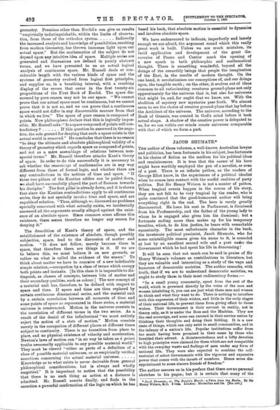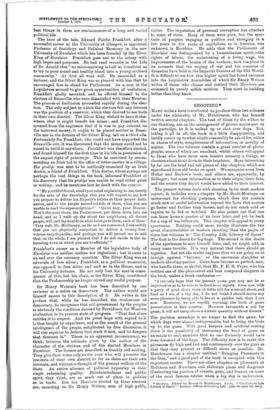JACOB SH1JMATE.*
THE author of these volumes, a well-known Australian lawyer and politician, has been fortunate in his subject, less fortunate in his choice of fiction as the medium for his political ideas and reminiscences. It is true that the career of his hero might have worthily employed the pen of a novelist, or even of a poet. There is an infinite pathos, as the readers of George Eliot know, in the experiences of a political idealist when he comes into contact with the sordid realities of party politics. But Sir Henry Wrixon is not a master of pathos. When tragical events happen in the course of his story, they are not felt to be very tragical by the reader, who is quite convinced that the good-humoured author will bring everything right in the end. The hero is rarely greatly disconcerted. He loses his seat in Parliament, is dismissed from his Professorship, and the father of the young lady to whom he is engaged also gives him his dismissal; but a fortunate ending more than makes up for his temporary troubles, which, to do him justice, he bears with remarkable equanimity. The most unfortunate character in the book, the inveterate political pessimist, Jacob Shumate, who for some unintelligible reason gives his name to it, is consoled at last by an excellent second wife and a post under the Government which he had spent his life in denouncing !
It will be seen that not much can be said in praise of Sir Henry Wiixon's volumes as contributions to literature, but they are valuable and interesting as a study of the ways and humours of democratic societies. The author remarks, with truth, that if we are to understand democratic societies, we ought to study them in their most rudimentary forms :—
"In a small young community, apart from the rest of the world, which is governed directly by the votes of the men and women inhabiting it, you can see just what these men and women do think and what they want to do. There is nothing to interfere with this expression of their wishes, and little in the early stages of their national life, to prevent them from giving effect to those wishes. Their Government is their servant in reality, not in theory only, as it is under the Boss and the Machine. They are the real sovereign, and none can succeed in their service unless by thinking their thoughts and doing their bidding. It is a new state of things, which can only exist in small communities, and in the infancy of a nation's life. Popular institutions suffer from too much having been promised in their name by those who heralded their advent. A disinterestedness and a lofty devotion to high principles were claimed for them which are not compatible with the everyday wants and feelings of men under any form of national life. They were also expected to combine the self- restraint of select Governments with the vigorous and expansive power that comes with the inrush of numbers. Hence arose dis- appointment to some sincere friends of freedom."
The author assures us in his preface that there are no personal sketches in his pages; but it is certain that many of the
• Jacob Shumate ; or, Th. People's March : a Voice from the Raab. By Sir Henry Wrizon, K.C. 2 vols. London: Macmillan and Co. Ella nog.
best things in them are reminiscences of a long and varied political life.
The hero of the tale, Edward Fairlie Frankfort, after a successful career at the University of Glasgow, is appointed Professor of Sociology and Political Economy in the new University of Excelsior which has been founded by the Silver King of Excelsior. Frankfort goes out to the colony with high hopes and purposes. He had read recently in the Life of Dr. Arnold that "no missionarising is half so beneficial as to try to pour sound and healthy blood into a young civilised community." At first all went -well. He succeeded as a lecturer, and the Silver King was so pleased with him that he encouraged him to stand for Parliament. As a seat in the Legislature seemed to give great opportunities of usefulness, Frankfort gladly assented, and he offered himself to the electors of Brassville, who were dissatisfied with their Member. The process of disillusion proceeded rapidly during the elec- tion. The only subject in which the electors felt any interest was the position of a reservoir, which they desired to see built in their own district. The Silver King wished to have it else- where, that it might benefit his mines ; and Frankfort dis- covered from the engineers that if it was to pay interest on the borrowed money, it ought to be placed neither in Brass- ville nor in the domain of the Silver King, but on a third site. Fortunately for Frankfort, who could not have supported the Brassville site, it was discovered that the money could not be raised to build it anywhere. Frankfort was therefore elected, and found himself for the first time in his life in possession of the august right of patronage. This he exercised by recom- mending an Irish lad to the office of letter-carrier in a village. His protege was sent to be medically examined by an Irish doctor, a friend of Frankfort. This doctor, whose sayings are perhaps the best things in the book, informed Frankfort of his discovery that his protege was unable to read either print or writing; and he mentions how he dealt with the case
My youthful friend, would you mind explaining to me, merely for the sake of the knowledge that you will impart to me, how you propose to deliver his Majesty's letters at their proper desti- nation, and to the people named outside of them, when you are unable to read the superscriptions ?' Quite aisy, your Honour. Won't the aunt there, the Postmistress, put them down into me hand, and as I walk up the street the neighbours, all decent people, will just lay houldt on what belongs to them, each of them.' 'Very well, Mr. McGlumpy, as far as I am concerned, I can certify that you are physically competent to deliver a twenty-four- volume encyclopaedia; and perhaps you will permit me to add that, on the whole, I am pleased that I do not reside in the in- teresting town in which you are to officiate.' "
Frankfort's career as a Member of the legislative body of Excelsior was neither useless nor inglorious ; but it came to an end over the currency question. The Silver King was an advocate of free silver ; Frankfort, as a political economist, was opposed to free silver, and said so in the House, and in his University lectm-es. He not only lost his seat in conse- quence of this, but his chair, as the Silver King considered that the Professorship no longer served any useful purpose.
Sir Henry Wrixon's book has been described by one reviewer as a satire on democracy. The author would not himself assent to this description of it. He writes in the preface that, while he has described the weaknesses of democracy, he recognises that self-government by the peoples is obviously the condition decreed by Providence for Western civilisation in its present state of progress. "That fact alone entitles it to respect. And the great hope with regard to it is that taught by experience, and as the result of the general intelligence of the people, enlightened by free discussion, it will rise superior to defects that mark it now, and to dangers that threaten it." There is an apparent inconsistency, we think, between the estimate given by the author of the character of the electors and of the elected Members in Excelsior. The former are described as frankly self-seeking. They give their votes only to the man who will promote the interests of their own district, so far as these are their own interests, and without a thought of the general welfare of the State. An entire absence of political hypocrisy is their single redeeming quality. Disinterestedness and public spirit, they think, are as much out of place in politics as in trade. But the Members elected by these electors are, according to Sir Henry Wrixon, men of high public virtue. The imputation of personal corruption has attached to none of them. Many of them were poor, but the spec- tacle of paupers engaging in politics and emerging in a few years in the ranks of capitalists, as in America, was unknown in Excelsior. He adds that the Parliament of Excelsior was distinguished by a humanitarian spirit,—the rights of labour, the maintaining of a living wage, the improvement of the homes of the workers, took the place in its counsels that the waging of war and the concerns of dynasties have held in the Imperial Senates of the Old World. It is difficult to see how this higher spirit has found entrance into the Legislative Assemblies of which Sir Henry Wrixon writes if those who choose and control their Members are animated by purely selfish motives. They must be building better than they know.



























































 Previous page
Previous page